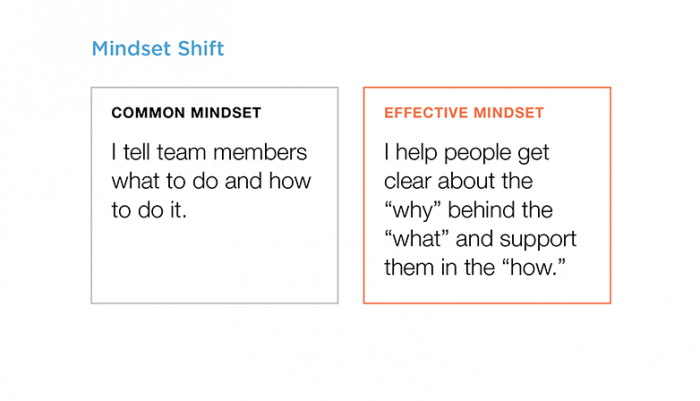Pratique 3: Mettre en place une équipe pour obtenir des résultats

Le pourquoi, le quoi et le comment.
Il est tentant pour les managers de prendre l’habitude de dire aux gens ce qu’ils doivent faire et comment ils doivent le faire. Cela peut sembler plus rapide, plus contrôlable et garantir le succès, mais cela étouffe la créativité et l’appropriation de l’équipe, fait peser un lourd fardeau sur le manager et détruit la confiance.
Les managers efficaces sont conscients de la valeur et de la contribution du travail de leur équipe à l’organisation parce qu’ils l’alignent sur les priorités de l’organisation. Les managers efficaces définissent et communiquent les objectifs de l’équipe et les résultats souhaités. Ils clarifient les résultats significatifs qui représentent l’épanouissement et la réussite de leur équipe. Enfin, ils délèguent le travail tout en apportant le niveau de soutien adéquat.
Pour être un leader efficace, il faut cesser de penser: je dis aux membres de l’équipe ce qu’il faut faire et comment le faire pour penser j’aide les membres de l’équipe à comprendre le “pourquoi” derrière le “quoi” et je les soutiens dans le “comment”.
Engagement progressif
Si les gens font leur travail uniquement parce que leur supérieur leur a dit de le faire, l’engagement de l’équipe diminue. Si les dirigeants disent à leurs équipes exactement comment déboguer le code, rédiger la demande de subvention ou atteindre un objectif, elles feront la même chose dans un an. Ce n’est pas extensible.
En revanche, un état d’esprit efficace aide les équipes à s’investir dans les décisions et à comprendre la vue d’ensemble qui se cache derrière les tâches quotidiennes. Les grands dirigeants planifient les objectifs avec leurs équipes plutôt que pour elles, et délèguent des tâches sans abandonner ou faire du micro-management.


Le défi consiste à créer une vision commune de ce qui est important, de ce qui compte le plus.
Votre Guide Complet
100+ Questions pour de meilleurs entretiens individuels
Ce guide vous donnera toutes les questions clés pour réussir vos entretiens individuels.
Votre guide
6 principes pour mobiliser et diriger les dirigeants
Découvrez les meilleures pratiques reconnues pour faire de vos collaborateurs une équipe performante.
Les 6 pratiques critiques pour diriger une équipe™
Diriger une équipe exige un état d’esprit différent de celui d’un collaborateur individuel. Explorez les changements d’état d’esprit critiques qui maximiseront le succès en tant que leader des autres.
Augmentez l’engagement des membres de l’équipe en organisant régulièrement des entretiens individuels, approfondissez votre compréhension des problèmes des membres de l’équipe et aidez-les à les résoudre par eux-mêmes.
Créez la clarté sur les objectifs et les résultats de l’équipe ; déléguez la responsabilité aux membres de l’équipe tout en fournissant le bon niveau de soutien.
Donner du feedback pour développer la confiance et la compétence des membres de l’équipe ; améliorer ses propres performances en demandant le feedback des autres.
Identifiez des actions spécifiques pour aider les membres de l’équipe à naviguer, à accélérer le changement ainsi qu’à obtenir de meilleures performances.
Utilisez la planification hebdomadaire pour vous concentrer sur les priorités les plus importantes, et renforcez votre capacité à être un leader efficace en appliquant les 5 moteurs d’énergie.



